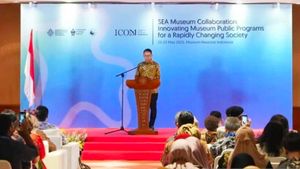JAKARTA - The Institute for Development of Economics and Finance (Indef) assesses that corruption in State-Owned Enterprises (BUMN) is partly driven by multiple positions at the state-owned company.
Executive Director of Indef Tauhid Ahmad said that SOEs have limited space to make decisions. This is because the concentration in the directors and commissioners is divided. This has opened up opportunities for corruption.
According to Tauhid, strategic decision-making can be disrupted and even delayed due to multiple positions. The results of decisions can also be influenced by the conflicts of interest of these state-owned company officials.
"In my opinion, it is correct. The first is a concurrent position, the second is the mechanism for the procurement of goods and services that is not strong enough for the supervisory mechanism," he said, when contacted by VOI, Friday, July 3.
Tauhid said that corruption can also occur due to lax regulations. According to him, regulations in BUMN must be strict. Because, if not, it will be difficult to hold concurrent positions.
"Indeed, there should not be concurrent positions for government agencies," he explained.
According to Tauhid, decision making for the procurement of goods and services in BUMN is different from that in the internal government. This is what makes the internal control process and system somewhat different from that of the government.
"The system in the government, for example, starts internally, there is already a Director General, DKPP, BPK and so on. Meanwhile, BUMN capital procures goods and services separately. So that there are spaces for corruption in terms of our regulations that occur," he said.
Erick Thohir Finds 53 Corruption Cases in BUMNThe rise of corruption that occurred in state-owned companies was first revealed by the Minister of BUMN, Erick Thohir. According to him, there have been 53 cases of corruption found. This happens because the directors play a dual role.
In fact, according to Erick, BUMN directors often mix interests between the economy and public services. He explained that this could happen because the red line between prioritizing public services or the economy was unclear.
In the end, said Erick, it was the directors who decided for themselves to mix up the assignment and the right business.
"There have been a lot of corruption cases, in the last few years there have been 53 corruption cases in BUMN," said Erick.
Complaint to the OmbudsmanMeanwhile, the Indonesian Ombudsman claimed to have received complaints regarding BUMN commissioners who had concurrent positions elsewhere. RI Ombudsman member Alamsyah Saragih said from the complaints that have been received, commissioners who have concurrently held positions often do not attend meetings or meetings to discuss company matters.
"I also received a lot of complaints from several commissioners who work very seriously and feel that many commissioners with concurrent positions have been difficult to attend. They are not asked for opinions but it is impossible for us to pay off the honorarium and bonuses," said Alamsyah.
BUMN commissioners who are serious about working, he said, often feel that they are treated unfairly by commissioners who have concurrent positions elsewhere. He also asked the SOE Ministry not to evade this issue because the Indonesian Ombudsman has strong evidence regarding the complaint.
"Don't dodge the matter, don't let the documents scatter. We want to be fine. This is no longer a campaign, please don't deny the Ombudsman if you don't have a good argument," he said.
The Indonesian Ombudsman looked closely at the recruitment of BUMN Commissioners and their subsidiaries, found several potential maladministration in the process. Read in full and the latest news from the Indonesian Ombudsman at: https://t.co/Kh1mxBQdsX#WaspadaMaladministrasi #LaporOmbudsman pic.twitter.com/y1Hyd6d4OG
- RI Ombudsman (@ OmbudsmanRI137) June 29, 2020
It is known, the Indonesian Ombudsman noted that there were 397 commissioners in BUMN in 2019 who were indicated to have concurrent positions elsewhere. In addition, as many as 167 commissioners in BUMN subsidiaries are also indicated to have the same problem.
Of these, 254 were from ministries, 112 were from non-ministerial institutions, and 31 were from academia.
The five ministries whose employees are mostly commissioners are the Ministry of BUMN with 55 people, the Ministry of Finance 42 people, the Ministry of PUPR with 17 people, the Ministry of Transportation 17 people, the Ministry of State Affairs 16 people, and the Coordinating Ministry for 13 people.
Meanwhile, for non-ministerial institutions, there are 27 people from the TNI, 13 people from the Police, 12 people from the Attorney General's Office, 11 people from the Regional Government, 11 people from the State Intelligence Agency (BIN), 6 people from the presidential office, 4 people from the BPK, and others as many as 19 people.
The English, Chinese, Japanese, Arabic, and French versions are automatically generated by the AI. So there may still be inaccuracies in translating, please always see Indonesian as our main language. (system supported by DigitalSiber.id)













